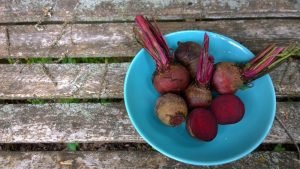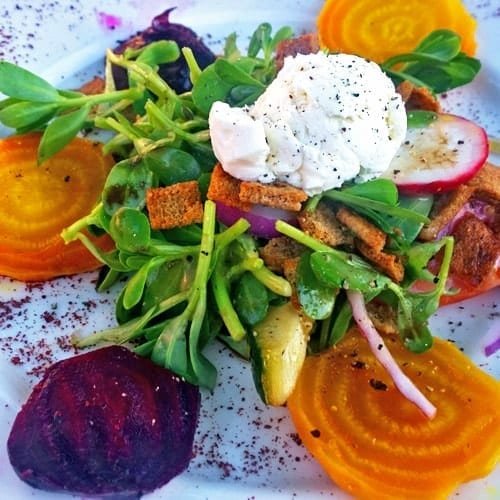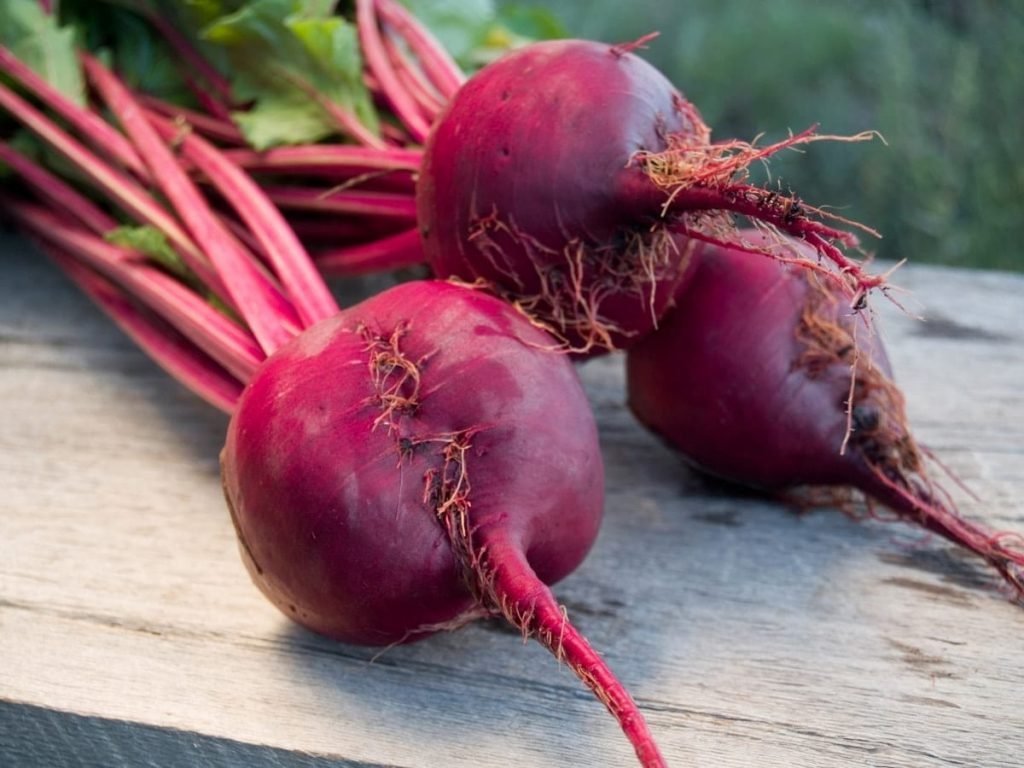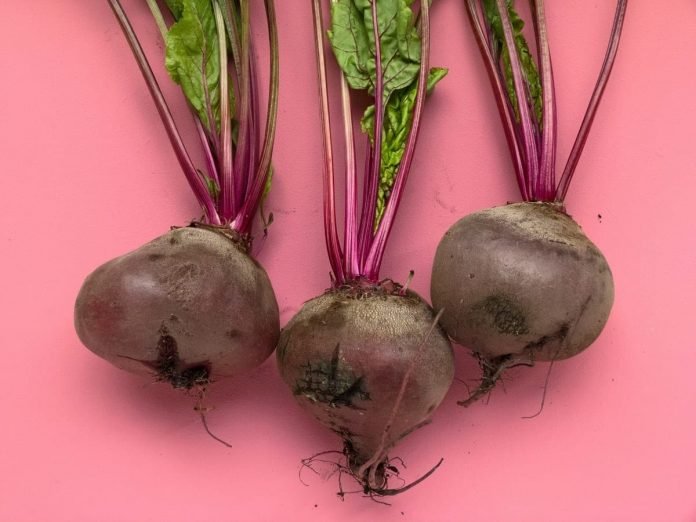Not a fan of beets? You are not alone. The beet tends to evoke adverse reactions. Many people passionately embrace the quirky vegetable, while others retract in horror at the sight of the beet with its crimson hues and distinct earthy taste. Yes – the beet gets a bad rap for its seemingly “dirt-like” flavor, but before you forever cast aside the beet, discovering its extraordinary superfood nutrients may encourage a change of heart.
The most common variety of beet is the red beet (table beet), but there are many varieties and types of beets, each with a particular flavor and nutrient profile. Served pickled, steamed, roasted, blended, juiced, (and even in cocktails), this versatile vegetable can be eaten from root to leaf. Besides its flavorful diversity, the beet is packed with superhero vitamins, minerals, and antioxidants. If you haven’t joined the beet fan club yet, these 5 incredible health benefits may inspire you to eat more beets!
SEE ALSO: How Could Quality Sleep Improve Your Health?
Beets Enhance Exercise Performance & Increase Circulation

Want to improve your performance at the gym and get better results when exercising? Beet juice is proving extremely beneficial for exercise performance. Natural nitrates (nitric oxide) found in beets increase circulation by helping dilate blood vessels. Studies show that cyclists who drank beet juice several hours before a race cycled up to 20% longer than the cyclists who drank a placebo beet juice. Beet juice is so effective that many athletes competing in the Olympics drink beet juice rather than Gatorade before events. Not a fan of beet juice? Eating whole beets is also beneficial. Studies prove that eating beets increases endurance and improves running performance.
Beets Improve Cardiovascular Function & Lower Blood Pressure
Do you have high blood pressure? Drinking beet juice may be the answer to reducing hypertension. Because the humble beet is filled with trace minerals, such as potassium, a rich mineral that is shown to reduce hypertension. High blood pressure (hypertension) causes many health issues and reducing blood pressure is vital for avoiding heart disease and stroke.

In addition to valuable trace minerals for heart health, the beet contains high levels of natural nitric oxide which encourages blood vessels to relax, improving blood flow to your organs and muscles. This is important for promoting healthy blood vessels and lowering blood pressure. A study in 2016 from the Journal of Human Hypertension states that drinking about 1 cup raw beet juice or consuming cooked beets (about 1 cup) significantly reduces high blood pressure. “Improving the level of N-O [Nitric Oxide] in the body can prevent, slow and even reverse many health problems particularly, cardiovascular disease” (Beet The Odds).
SEE ALSO: What is the Worst Feeling about Relationships?
Beets Reduce Inflammation

Beets, especially red beets, contain high amounts of antioxidants. The vibrant color of the red beet that stains its way to the dinner table is a fantastic gift from mother nature that reduces inflammation. The beetroot’s crimson hue is a mixture of nitrogen- containing pigments called betalains. Therefore, these betalains are powerful antioxidants.
Antioxidants help us eliminate free-radicals that damage the body’s cells causing inflammation. The antioxidants found in beets act as anti-inflammatory molecules protecting the body against oxidative stress which may lead to serious long-term health effects, such as diabetes, cardiovascular disease, cancer, degenerative diseases, and more. The beet’s super antioxidants are just one of the many reasons to add beets to your diet.
Beets Detoxify and Support Digestive Health
Besides reducing inflammation, the beet’s superhero antioxidants offer incredible detoxification support. The beet is filled with antioxidants and fiber to help eliminate excess toxins and keep your bowel movements regular! Furthermore, betalains (antioxidants) help stimulate the body’s detoxification enzymes to eliminate toxins promoting a healthy liver.
Is your liver happy? A sluggish liver often leads to a weakened immune system, clogged pores, fatigue, and slower metabolism. Drinking beet juice and consuming beets helps keep your digestive system healthy and happy. Don’t be alarmed if you see a pink or red hue in the toilet bowl after eating beets or drinking beet juice. The red or pink color in your urine (and stools) after eating beets can cause much distress and alarm, but the discoloration is a harmless condition called beeturia.
Beets Boost Immunity

Feeling under the weather? Follow Popeye’s example and eat your greens, especially beet greens! Although the entire beet from root to leaf is packed with delicious nutrients, the beet greens (the leafy portion atop the beetroot’s stems) contain high levels of Vitamin C which is important for boosting immunity, helping wounds heal, aiding in the absorption of iron, repairing/maintaining cartilage and bones, and more. Beet greens are comparable to the flavor of Swiss Chard and are quite versatile. They can be eaten raw in salads or smoothies, sautéed with olive oil and/or lemon juice, or even steamed in soups.
SEE ALSO: The Power of Color – Color Meanings
How to Eat Beets?

Feeling inspired to eat more beets but don’t know how? Beets are quite versatile. You can juice raw beets with delicious orange, apple, and/or ginger. Moreover, blending raw or cooked beets with your favorite fruits is another great way to enjoy the beet’s health benefits and increase your fiber intake. Roasting beets and adding them to salad with goat cheese and blood orange is spectacular, or you can shred beets to combine with black beans and cilantro for a scrumptious veggie burger. The sweet earthy beet is also delightfully disguised in pancakes, muffins, and chocolate cupcakes!
Additionally, check out these beet recipes for more ideas.
ARTICLE REFERENCE DIRECTORY
Asgary, S., et al. (2016). Improvement of hypertension, endothelial function and systemic inflammation following short-term supplementation with red beet (Beta vulgaris L.) juice: a randomized crossover pilot study. Retrieved from https://www.researchgate.net/publication/303887022
Bryan, Nathan S. and Carolyn Pierini. (2013). Beet the Odds: Harness the Power of Beets to Radically Transform Your Health. Austin, Texas: Neogenis Laboratories.
Dominguez, Raul, et al. (2017). Effects of Beetroot Juice Supplementation on Cardiorespiratory Endurance in Athletes. A Systematic Review. Retrieved from https://www.ncbi.nlm.nih.gov/pmc/articles/PMC5295087/.
Murphy, M., K. Eliot, R.M.,Heuertz, and E. Weiss. (April, 2012). Whole Beetroot Consumption Acutely Improves Running Performance. J Acad Nutr Diet. Retrieved from http://www.ncbi.nlm.nih.gov/pubmed/22709704.
Palanisamy, Arulselvan, et al. (2016). Role of Antioxidants and Natural Products in Inflammation. Retrieved from https://www.ncbi.nlm.nih.gov/pmc/articles/PMC5075620/.
Hirai, Daniel M., T. Musch, and D.C. Poole. (2015). Exercise Training in Chronic Heart Failure: Improving Skeletal Muscle O2 Transport and Utilization. Retrieved from https://www.physiology.org/doi/full/10.1152/ajpheart.00469.2015.


